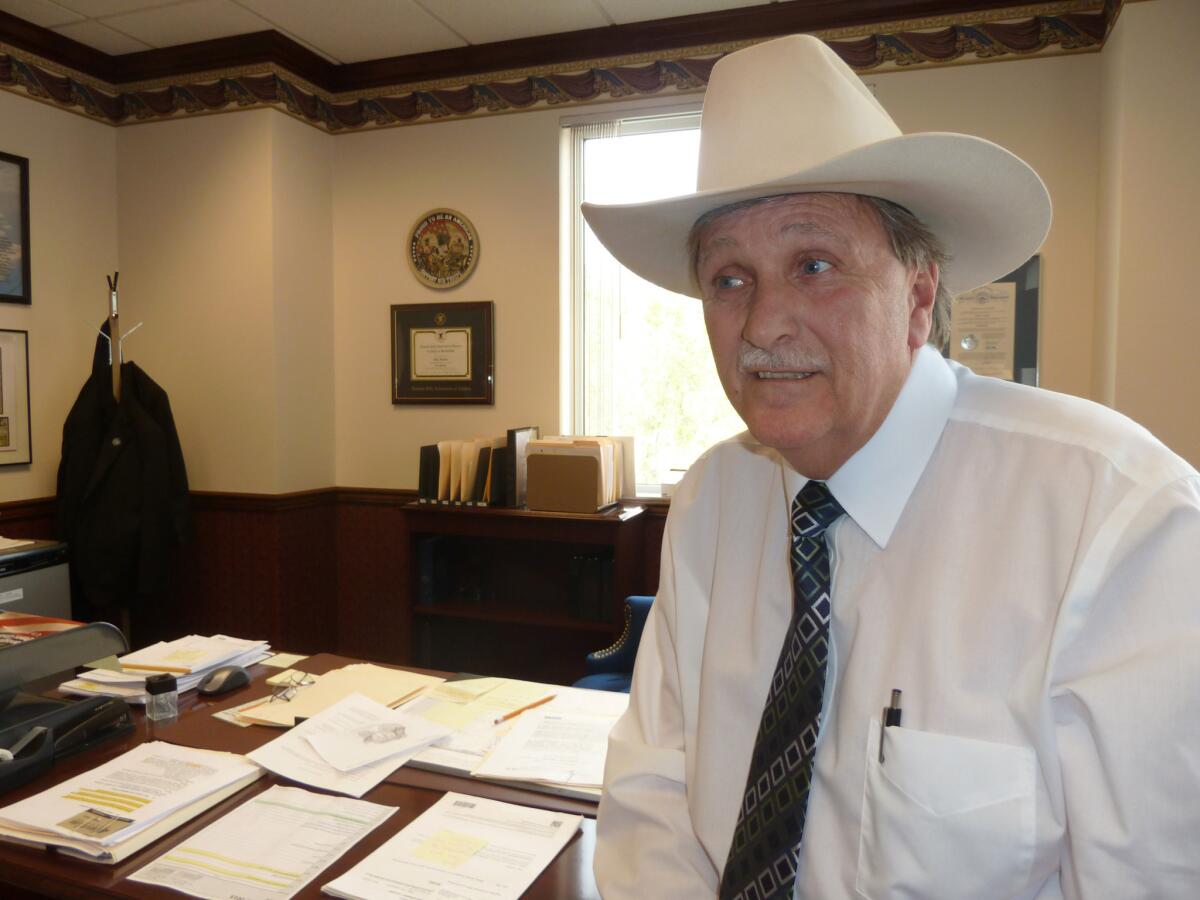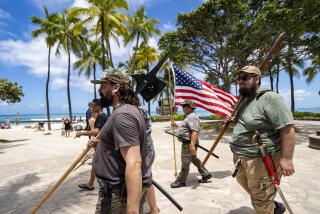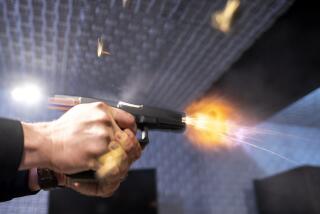Nevada lawmaker seeks to legalize switchblades, saying they ‘get a bad rap’

Nevada Assemblyman John Ellison says, “I carry all kinds of concealed guns and knives. It doesn’t mean I’m going to hurt somebody.”
- Share via
Reporting from CARSON CITY, Nev. — John Ellison is a cowboy philosopher who knows his ranching hardware.
The state assemblyman and lifelong cattleman prefers a scuffed-up Bailey cowhand hat, with the brim wide and turned up at the ends. He likes guns and has been known to carry a .22- or .45-caliber weapon to work at the Legislature.
But he prefers devices with a sharper edge — Buck knives, switchblades and even stilettos. The Elko native, who grew up castrating bulls and cutting fences, considers a well-honed blade one of the tools of his country trade, rather than a weapon.
A working electrician, part-time citizen politician and full-time 2nd Amendment rights advocate, the 62-year-old Republican supports efforts to relax the state’s knife laws, part of a national trend to rethink the perils of what many supporters call the misunderstood switchblade.
Ellison has spoken out for two bills that would legalize buying, selling and carrying switchblades without a concealed-weapons permit.
Whether cutting-edge or dull-minded, Ellison calls the bills pure cowboy logic.
“I’ve always carried a pocket knife. It’s part of the rural life,” he said, sitting in an office overlooking the High Desert. “Knives get a bad rap. I carry all kinds of concealed guns and knives. It doesn’t mean I’m going to hurt somebody.”
States such as Tennessee, Indiana and Alaska are the latest to pass laws to legalize switchblades, which are now allowed in 38 states, including 26 with no restrictions, such as length or concealed carry.
Seven repeals of knife bans have been passed since 2010. (California still outlaws switchblades more than 2 inches long and has no current legislation to change that.)
In 2013, the federal government proposed allowing smaller pocket knives on airplanes for the first time since the Sept. 11 terrorist attacks. The regulatory proposal was withdrawn after complaints by flight attendants and others.
Knife rights lobbyists say the laws aren’t just the work of rural politicians. The movement, they insist, has hit the big city as well.
“This is not about a bunch of yahoos and rural ding-dongs trying to push their values on urbane society,” said Todd Rathner, a lobbyist for a group called Knife Rights who has testified before the Nevada Legislature. “This has to do with the right to decide for yourself what knives you want to carry, what tools you want to use.”
In New York, a Democratic assemblyman from Manhattan, Dan Quart, has introduced a bill to rewrite the language of a law against a switchblade-type weapon known as a gravity knife; it would make prosecutors prove an intent to commit a crime before people can be prosecuted for mere possession of the knives.
Advocates say the existing law has been aggressively used to arrest thousands of residents — including artists, construction workers and other laborers — for carrying common pocket knives.
In 2013, Texas state Rep. Harold Dutton Jr., a Democrat who represents areas of urban Houston, championed the effort to make switchblades legal statewide. He was an unlikely ally of the 2nd Amendment crowd: At the time the law passed, Dutton carried an F rating by the National Rifle Assn.
Lobbyists say that switchblades and other maligned devices such as daggers and dirks (a Scottish blade) pose a real mortal hazard only if you’re a character in the game of Clue.
“In many cases of domestic violence, kitchen knives are pulled from the drawer, so why not make them illegal?” Rathner asked. “Why pick on the switchblade?”
The problem, he says, dates back to the 1958 Switchblade Knife Act, a federal law that made the implement the knife version of Public Enemy No. 1.
“Somebody was watching way too much Hollywood,” he said. “People watched movies like ‘Blackboard Jungle’ and ‘Rebel Without a Cause’ and the play ‘West Side Story’ and went into an uproar.”
He added: “They also ruined the reputation of gun silencers, which were designed as a tool. Even today, people still think the switchblade is for gangsters, punks and street hoods.”
Chuck Callaway, the lobbyist for the Las Vegas Metropolitan Police Department, begs to differ.
“In my mind, it all comes down to what the knife was designed for,” he said. “Any double-edged knife that can penetrate a bulletproof vest seems like a weapon made to kill. Why would we legalize them to be carried concealed? It’s a matter of public safety: It just puts the lives of police officers and others in jeopardy.”
Ellison has his own scenario for whipping out a switchblade.
“Listen, castrating a bull is hard enough with two hands, but it was made a hell of a lot easier if you could whip out your switchblade with one hand and get the job done,” he said.
Ellison carried a switchblade at the ranch and at school, until one day the sheriff took him aside. “He said, ‘You can’t carry those things no more.’ And I said, ‘Why?’ And he said, ‘ ‘Cause they outlawed ‘em.’ That was rural life.”
His solution about knives: Apply a little rural common sense.
“People are afraid of them; today they’re afraid of everything,” he said.
Twitter: @jglionna
More to Read
Sign up for Essential California
The most important California stories and recommendations in your inbox every morning.
You may occasionally receive promotional content from the Los Angeles Times.














